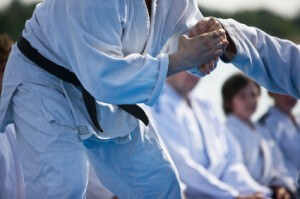Judo Rules And Religion Give Conflicting Requirements For Saudi Olympian
August 3rd, 2012

Officials at the London Olympics believe that wearing a hijab will make judo, a form of martial arts that involves grappling and takedowns, exceedingly dangerous.
On Monday, Wojdan Shaherkani walked alongside her father through the Olympic judo venue. The sixteen-year old girl wore a light-pink scarf wrapped around her head. She moved with hesitation, hoping that she would come away from the Olympics as a pioneer and not a casualty of diplomacy.
Her fears are not necessarily unfounded. Ms. Shaherkani and one other female, runner Sarah Attar are the first Saudi Arabian women to be sent to the Olympics. Internationally, their selection was applauded as groundbreaking due to the fact that Saudi Arabia is one of the most conservative Muslim countries in the entire world. However, before even taking the mat in her first competition of the women’s heavyweight judo tournament, the legacy of Ms. Shaherkani is already in danger.
Her father, along with Saudi Arabian officials, will not allow the removal of her hijab, the headscarf that Muslim women traditionally wear according to religious law. This was not a problem until the previous week, when the International Judo Federation ordered that she remove it during matches in order to compete in the tournament. According to the Federation, keeping the hijab on during the match would be a safety hazard. As of Monday, the International Judo Federation and the Saudi Arabian Olympic Committee have yet to reach a compromise. Neither party has been available for comment.
The information concerning Ms. Shaherkani’s judo career before the Olympics began was lacking to such a degree that her name had been misspelled by the International Olympic Committee. Almost no one noticed when she appeared alongside her father on Monday in order to take in some judo at the Excel Centre in London. It was only when she was headed out to lunch that she was approached by a reporter. She did not say a word, electing to let her father handle the reporter’s questions. Her father explained that she did not know English. He told the reporter that it was necessary for his daughter to compete in order to make history in the name of Saudi Arabian women. When asked about the controversy concerning the headscarf, he responded that negotiations should end soon. The reporter asked the father if he would allow his daughter to compete without the hijab. He politely refused to answer.
Saudi Arabia strictly regulates the activities of its female citizens. Saudi Arabian women are not allowed to participate in sporting events in front of crowds made up of both men and women. They must learn how to play sports at home as they are not offered any physical education classes or sporting options at school. It is even against the law for women to drive.
The father and daughter both participated in the opening ceremony on Friday, marching behind the men on Saudi Arabia’s Olympic team. Opinions on the two have been split, with some hailing them as heroes while others deride them as being prostitutes.
Several of the Olympic “judokas,” or those who practice judo, revealed in interviews that they see no danger in allowing Mr. Shaherkani to keep her scarf on. They argued that worst-case scenario, the scarf might fall off. However, the competitors have dividing opinions about following the rules. Some believe religion should play no part in the Japanese martial arts form, that everyone must compete under the same rules no matter what creed they belong to. Others believe wearing a piece of clothing has nothing to do with the rules.
In any event, a decision on the legality of headscarves like the hijab is expected to be revealed by the Olympics Committee within the next couple of days.


